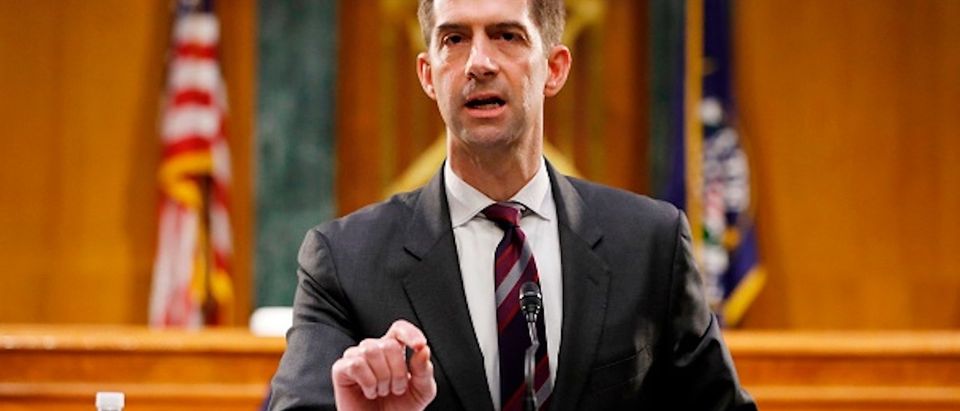Republican Arkansas Sen. Tom Cotton faced a barrage of criticism on three occasions amid a wave of riots and a global pandemic. Yet Cotton’s allegedly controversial opinions have been largely vindicated by recent events.
As a flurry of racial justice protests turned from peaceful democratic demonstrations to violent riots, Cotton penned an immediately controversial Op-Ed. In a piece published June 3 by the New York Times, Cotton argued that President Donald Trump should invoke the Insurrection Act to restore order in parts of the country set aflame by outrage and opportunism. Cotton argued that rioters were effectively encouraged by elites who labeled it an “understandable response to the death of George Floyd.”
“Those excuses are built on a revolting moral equivalence of rioters and looters to peaceful, law-abiding protesters,” Cotton wrote. “A majority who seek to protest peacefully shouldn’t be confused with bands of miscreants.”
Cotton laid out for readers a clear historical case to call in the military to assist local law enforcement in quelling the unrest–citing well-known cases, the likes of which included former President Dwight Eisenhower sending in the National Guard to ensure desegregation in Arkansas.
But the Op-Ed met sharp criticism from New York Times staffers who argued the piece imperiled the lives of its black employees. Other writers blasted his piece as an idea antithetical to the constitution. NYT staff writer Roxanne Gay tweeted that the piece failed meet the criteria the paper held for amplifying a diverse range of opinions. Rather, she argued Cotton’s editorial was “inflammatory and endorsing military occupation as if the constitution doesn’t exist.”
Running this put Black @nytimes staffers in danger. In solidarity with my colleagues who agree. pic.twitter.com/UfkZkE1xvj
— Jenna Wortham (@jennydeluxe) June 3, 2020
Following the Jan. 6 riot at the Capitol, tens of thousands of National Guard troops were called into action to defend Capitol grounds and various parts of Washington, D.C. to discourage further acts of insurrection. Cotton tweeted the day of the siege that “violence is unacceptable and needs to be met with the full force of the law.”
The idea that the coronavirus pandemic was born of anything outside a natural phenomenon was a notion largely derided by corporate media outlets. Again, an outline of possible causes for the origin of the deadly virus tweeted by Cotton met a swift, severe rebuke. Among the four possible sources of the outbreak the Republican Senator mentioned was the possibility that it might be traced to a lab in Wuhan rather than animal transmission. Cotton had previously mentioned that a food market at the center of the outbreak was in close proximity to an infectious disease lab.
“We don’t know where it originated, and we have to get to the bottom of that,” Cotton said in February 2020. “We also know that just a few miles away from that food market is China’s only biosafety level 4 super laboratory that researches human infectious diseases.”
Responding to Cotton’s comments, professor at the Massachusetts Institute of Technology Vipin Narang told the Washington Post that it was “highly unlikely” the origin of COVID-19 was a Wuhan lab–adding it is illogical to assume that the virus was in any way a “bio-weapon that Chinese developed and either purposefully or accidentally released.
“Cotton should spend more time funding the agencies in the United States that can help contain and combat the virus rather than trying to assign blame,” Narang continued.
But a recent report from New York Magazine’s Nicholson Baker notes that it might not be a far-fetched conspiracy to question the source of the global pandemic as anything other than the widely spread idea that the virus originated in nature.
“Proposing that something unfortunate happened during a scientific experiment in Wuhan — where COVID-19 was first diagnosed and where there are three high-security virology labs, one of which held in its freezers the most comprehensive inventory of sampled bat viruses in the world — isn’t a conspiracy theory. It’s just a theory,” Baker wrote. (RELATED: Did Coronavirus Come From A Lab? Ten Key Takeaways From A Shocking New Report)
Ralph Baric, a microbiologist interviewed by Baker said that a laboratory mishap leading to an outbreak was not outlandish to consider.
“Can you rule out a laboratory escape? The answer in this case is probably not,” Baric said.
Days before the Capitol riot, Cotton announced he would not join a group of lawmakers challenging the results of the Electoral College–a move that prompted criticism from the president. Trump assured Cotton that his decision imperiled the Arkansas Senators future, as Republican voters would remember Cotton’s decision to abandon the president’s last ditch electoral efforts.
“How can you certify an election when the numbers being certified are verifiably WRONG,” Trump tweeted. “You will see the real numbers tonight during my speech, but especially on JANUARY 6th. @SenTomCotton Republicans have pluses & minuses, but one thing is sure, THEY NEVER FORGET!”
Yet Cotton maintained electoral power resided with voters rather than lawmakers and added that challenging electoral legitimacy would only fuel Democrats who may want to disrupt the system.
“The Founders entrusted our elections chiefly to the states — not Congress,” Cotton said. “They entrusted the election of our president to the people, acting through the Electoral College — not Congress.”
“Objecting to certified electoral votes won’t give him a second term,” said Cotton, referring to Trump. “It will only embolden those Democrats who want to erode further our system of constitutional government,” Cotton concluded.












